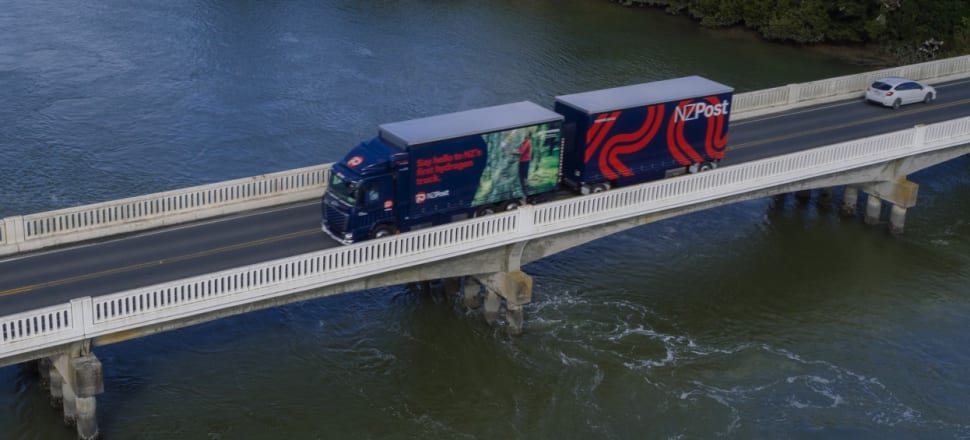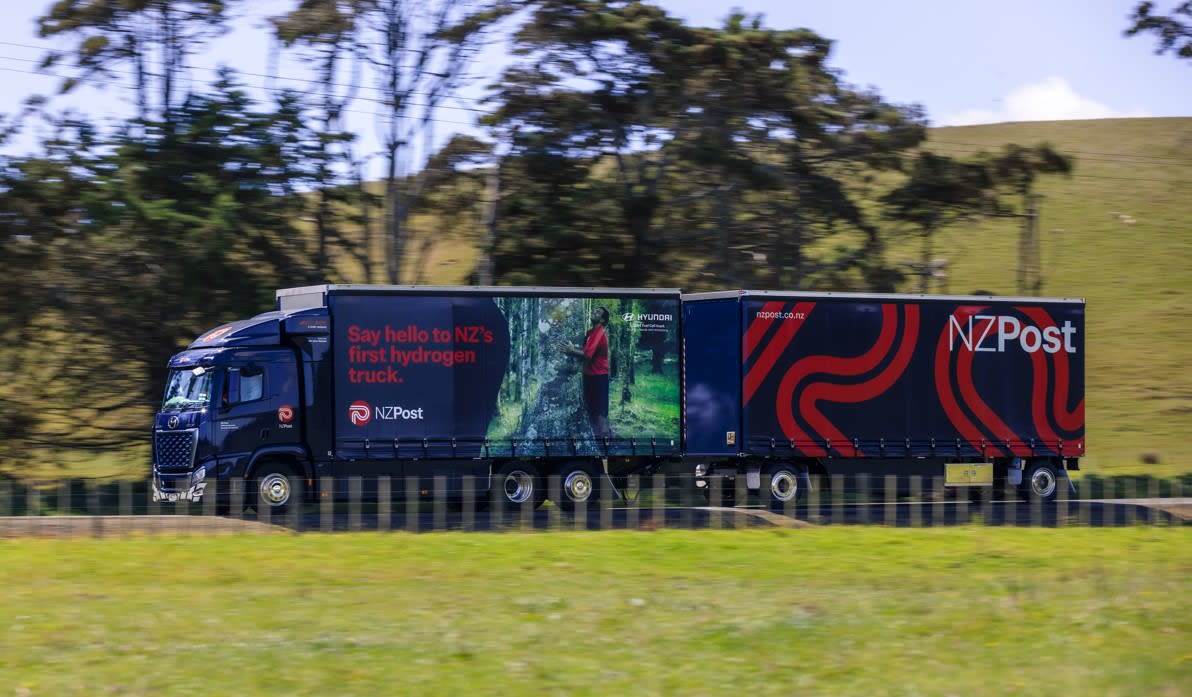
The reality of freight being moved around New Zealand in heavy trucks powered by green hydrogen is edging closer. NZ Post has been trialling a hydrogen powered truck for a year and the results are promising. Mark Jennings reports.
In an industrial part of Mt Wellington, not far from the Sylvia Park shopping centre, Grant Doull watches as a large truck is refuelled with hydrogen.
“You can see it is a real working truck,” says Doull, National Manager Hydrogen & Eco Commercial Vehicles at Hyundai New Zealand.
He is referring to the light coating of road dirt on the bottom half of the truck - a sign it had come straight off Auckland’s rain-soaked roads.
Eighteen months earlier Doull drove the same truck, then gleaming white and just arrived from South Korea, into a yard where a group of transport industry executives were being addressed by Michael Wood on the Government’s plans for decarbonising the heavy transport sector. The truck was so quiet most of the group didn’t notice its arrival.
A further six months on, after conversion to right hand drive, the truck, now sporting a red and blue livery, was handed over to NZ Post to begin operational trials.
It’s the same truck now being refuelled at Hyundai’s headquarters in Mt Wellington where Auckland’s only hydrogen plant is located.
Doull says the lack of green hydrogen facilities has constrained the trial but this will change as Taranaki based Hiringa Energy rolls out stations in Wiri (South Auckland), Te Rapa (Hamilton), Tauranga and Palmerston North in the next few months. Twenty more stations will be built over the next five years.
These stations, with state of the art technology, will enable refuelling in 15 minutes.
Since the trial was launched in July last year, NZ Post says the The zero emission, Hyundai XCIENT FCEV (Fuel Cell Electric Vehicle) has been deployed on full commercial operations between Auckland and Hamilton to assess its performance on New Zealand roads and conditions.
Ryan Beale, NZ Post’s National Road Operations manager says the trial is going smoothly.
“We are doing 350 kms a day (without refuelling) 5 days a week……. The primary challenge has only been around the refuelling. We’ve been hampered by that inability to go further, we would love to be doing it for 18 hours a day.”
The truck is being trialled by NZ Post contractor Shea Transport Limited. Director Neil Dennett drove it himself for the first 10 days of operation.

"We are in the business of trucks and I can tell you this is a remarkable truck, I’m very impressed. I’m surprised how quiet it is and how it drives. They put it to me that I would feel less tired or stressed at the end of a driving shift and I thought nah that won’t be the case but I actually found that it was true. I recently did a few nights driving one of our diesel trucks and I ended up wishing I was back in the hydrogen truck.”
“I think it is the way forward for the industry. Particularly once the trucks come in different configurations. At the moment we have one configuration and we will need different configurations for sectors like logging etc. Big companies like Fonterra could make hydrogen at their sites so there won’t be the need to truck lots of diesel around the country.”
Currently, the upfront cost of a hydrogen fuel cell truck is more than an equivalent heavy diesel truck and the cost of fuel (hydrogen) is more expensive. Dennett expects the cost gaps to narrow in the next few years.
“Scale will bring the costs down. When the first car arrived it would have been more expensive than the existing horse and cart but no one complained because it was the start of a technological journey. We are now at the beginning of another journey that I never thought in my lifetime would be coming.”
Dennett says there are two other factors that may turn out to be significant positives for hydrogen powered trucks.
"We do a lot of preventative maintenance on our current (diesel) fleet and while it is too early to say (after one year of operation) it’s possible that the hydrogen trucks won’t require as much work. Another thing that we have found is that there are huge gains to be made by driving it economically. With diesel the gains are very small.”
Based on typical heavy vehicle mileage, NZ Post says one fuel cell truck in operation avoids the equivalent CO2 of around 112 fossil fuel cars – making a big difference to its sustainability goals.
New Zealand’s heavy truck fleet makes up 4 percent of the transport sector but is responsible for 25 percent of its carbon emissions.
But using hydrogen as a fuel has its critics, particularly when it comes to EROI (Energy return on energy investment). Hydrogen takes a lot of energy to make and therefore FCEVs aren’t as energy efficient as pure battery electric vehicles (BEVs). They argue the transport industry should look to EV trucks that can quickly exchange batteries or the railways should be electrified and used to move long haul freight.
NZ Post’s Ryan Beale says he is keeping an open mind.
“We’ve gone 'let’s understand what the electric options provide us with and what the hydrogen options provide us with' - and for us, today, the hydrogen truck has the capacity to move our freight overnight, whereas the battery electric wouldn’t give us that.
“The energy efficiency of the process is part of the puzzle but our main focus is being able to move the freight across the country in a green fashion. Battery electric trucks have been successful (NZ Post operates a courier fleet of EVs for short haul) and I understand the concerns around hydrogen but it is providing us with solution that meets our sustainability criteria.
“Green hydrogen as a transport fuel is still an early generation product and as it evolves I think we may see improvements in that area (energy efficient production) but I do understand the concerns.”
Hyundai NZ's Doull is hoping the Government’s “road map” for hydrogen, due to be released soon, will provide further momentum for the transport sector’s move to a more sustainable future. He points to Switzerland which started operating Xcient fuel cell trucks in 2020. There are now 47 FCEVs operating across the country and 21 companies are working together to build a fully-fledged green hydrogen ecosystem.
Doull sees great potential for FCEVs in what is known in transport circles as the ‘golden triangle’ Auckland – Hamilton – Tauranga.
“The golden triangle has two ports and a high volume of freight. With the new refuelling stations a fleet of 30 to 50 FCEVs could operate in the triangle and remove a lot of noise and pollution. In fact, I think, with early government support it could quite quickly become the green triangle.”
* Hyundai is a foundation supporter of Newsroom







